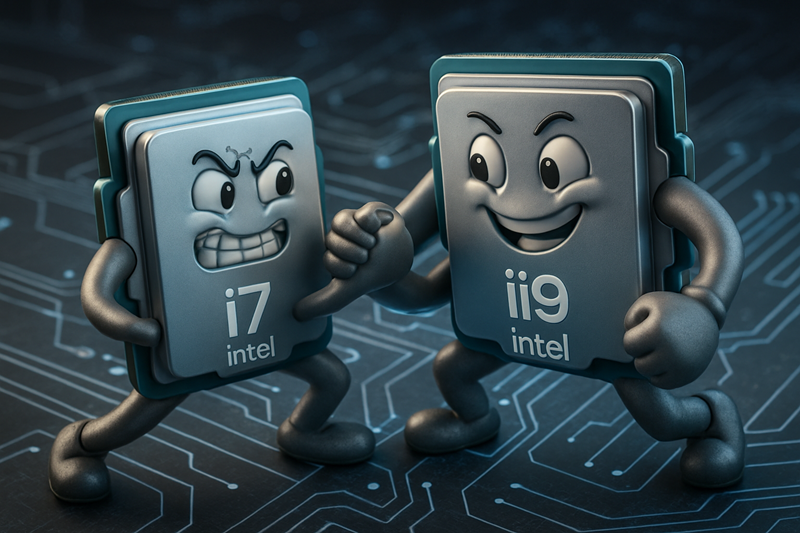Is i7 Better Than i5? A Complete Guide

When shopping for a new PC or laptop, one of the most common questions is: Should I choose an Intel Core i5 or an Intel Core i7 processor? Both belong to Intel’s Core series, which also includes i3 (entry-level) and i9 (high-end). These processors power most modern desktops and laptops, but the differences between them can significantly impact performance, price, and suitability for your needs.
What Are Intel Core i5, i7, and i9?
- Intel Core i5: A mid-range CPU designed for mainstream users. It offers solid performance for everyday tasks, light gaming, and moderate multitasking.
- Intel Core i7: A higher-tier CPU with more cores, higher clock speeds, and larger cache. It’s ideal for power users who need extra performance for demanding tasks.
- Intel Core i9: The flagship consumer CPU, offering the highest core counts, fastest speeds, and advanced features for professionals and enthusiasts.
What Do “i5”, “i7”, and “i9” Mean?
These numbers indicate performance tiers, not generations. For example:
- i5 = Mainstream
- i7 = High-performance
- i9 = Enthusiast/Professional
Each tier exists across multiple generations (e.g., 10th, 11th, 12th Gen), so always check the generation number for context.
Key Differences Between i5 and i7
| Feature | Intel Core i5 | Intel Core i7 |
|---|---|---|
| Cores/Threads | 4–6 cores, 8–12 threads | 6–8 cores, 12–16 threads |
| Base Clock Speed | 2.5–3.5 GHz | 2.8–4.0 GHz |
| Turbo Boost | Yes | Yes (higher boost speeds) |
| Cache Size | 8–12 MB | 12–16 MB |
| Hyper-Threading | Sometimes | Always |
| Integrated Graphics | Intel UHD / Iris Xe | Intel UHD / Iris Xe |
| Price Range | Lower | Higher |
Pros and Cons of Intel Core i5
| Pros | Cons |
|---|---|
| Affordable price | Lower core/thread count |
| Great for everyday tasks | Slower in heavy multitasking |
| Energy-efficient | Not ideal for 4K video editing |
| Good for casual gaming | Limited future-proofing |
Pros and Cons of Intel Core i7
| Pros | Cons |
|---|---|
| Excellent for multitasking | Higher cost |
| Great for gaming and content creation | More power consumption |
| Handles 4K video editing easily | Overkill for basic users |
| Future-proof for several years | Generates more heat |
Why i7 Is Better for Heavy Workloads
- More cores and threads: Handles multitasking and parallel processing better.
- Larger cache: Speeds up repetitive tasks like spreadsheet calculations.
- Higher Turbo Boost: Improves performance in single-threaded tasks.
However, i5 is still excellent for most users. If your workload is light to moderate, an i5 offers great value without overspending.
What About i9?
Intel Core i9 is designed for:
- Professional video editing
- 3D modeling
- Scientific computing
- Extreme gaming setups
For most users, i9 is overkill unless you need workstation-level performance.
Performance Scenarios: Which Should You Choose?
| Use Case | Recommended CPU |
|---|---|
| Web browsing, Office apps | i5 |
| Casual gaming | i5 |
| High-end gaming (with GPU) | i7 |
| Video editing (4K) | i7 |
| 3D rendering, CAD | i7 |
| Streaming + Gaming | i7 |
| Budget-conscious buyers | i5 |
Final Verdict
- Choose i5 if you’re a casual user, student, or light gamer.
- Choose i7 if you’re a content creator, gamer, or multitasker.
- Choose i9 only for professional or enthusiast-level workloads.
